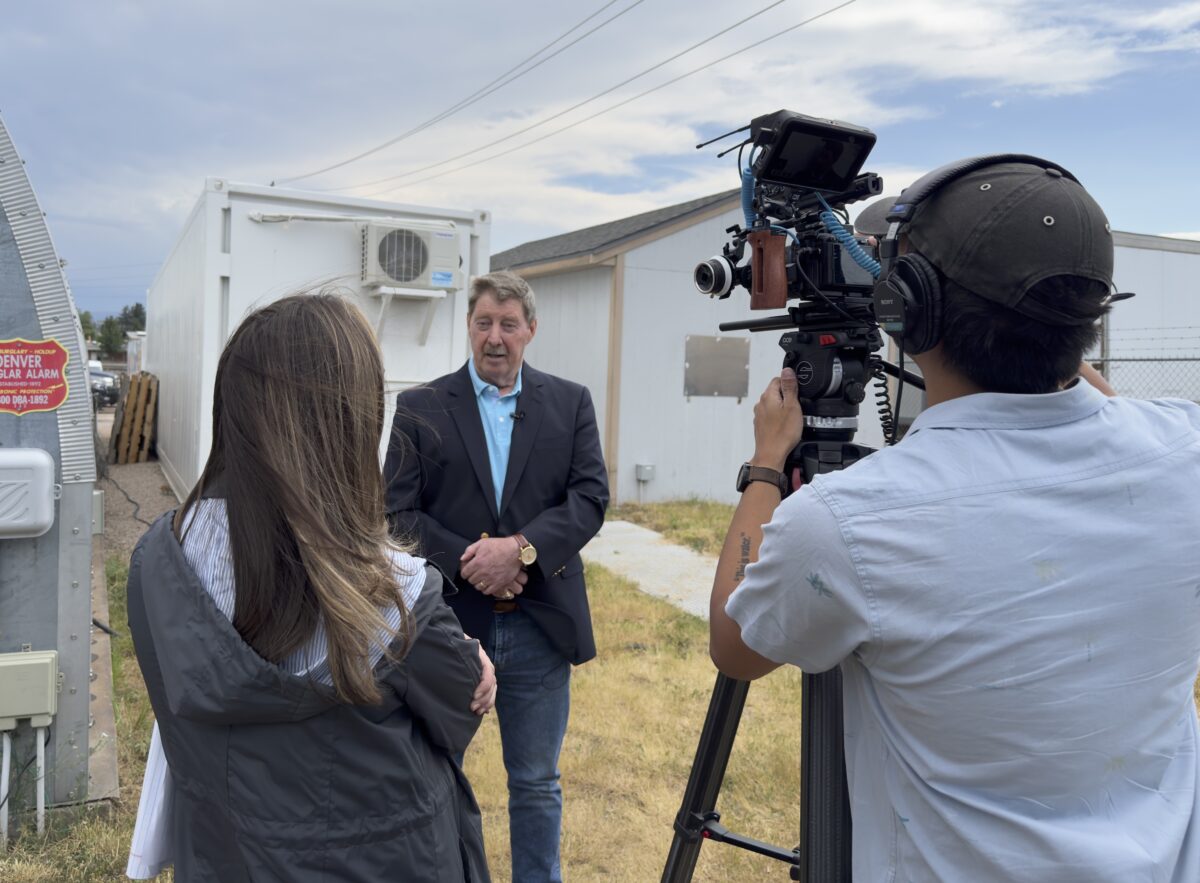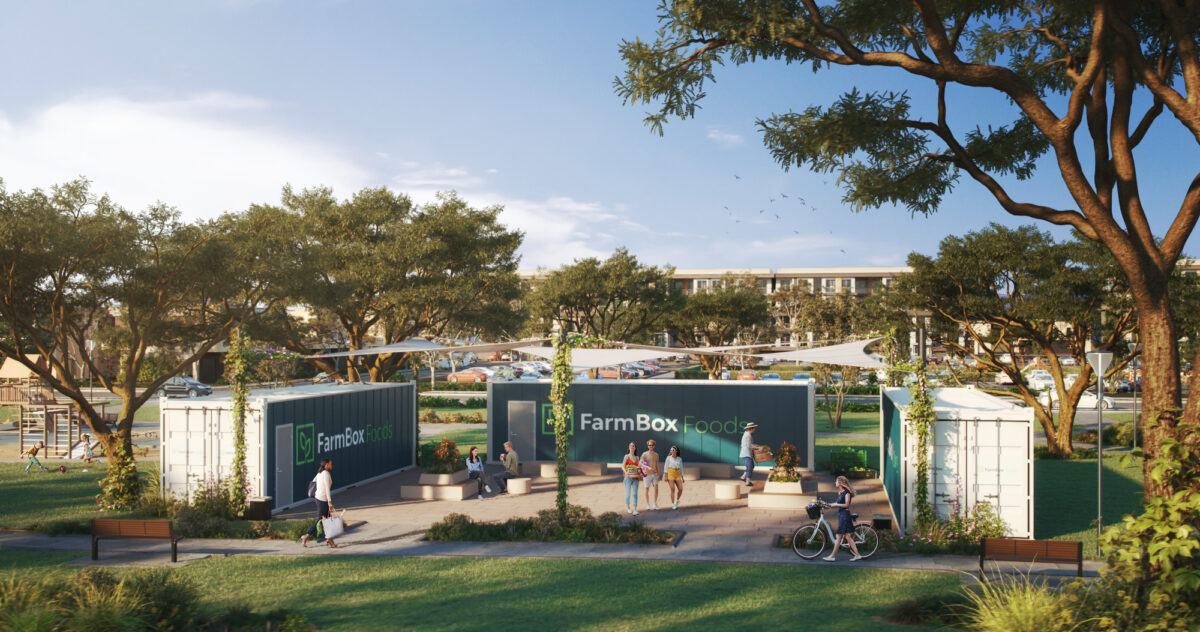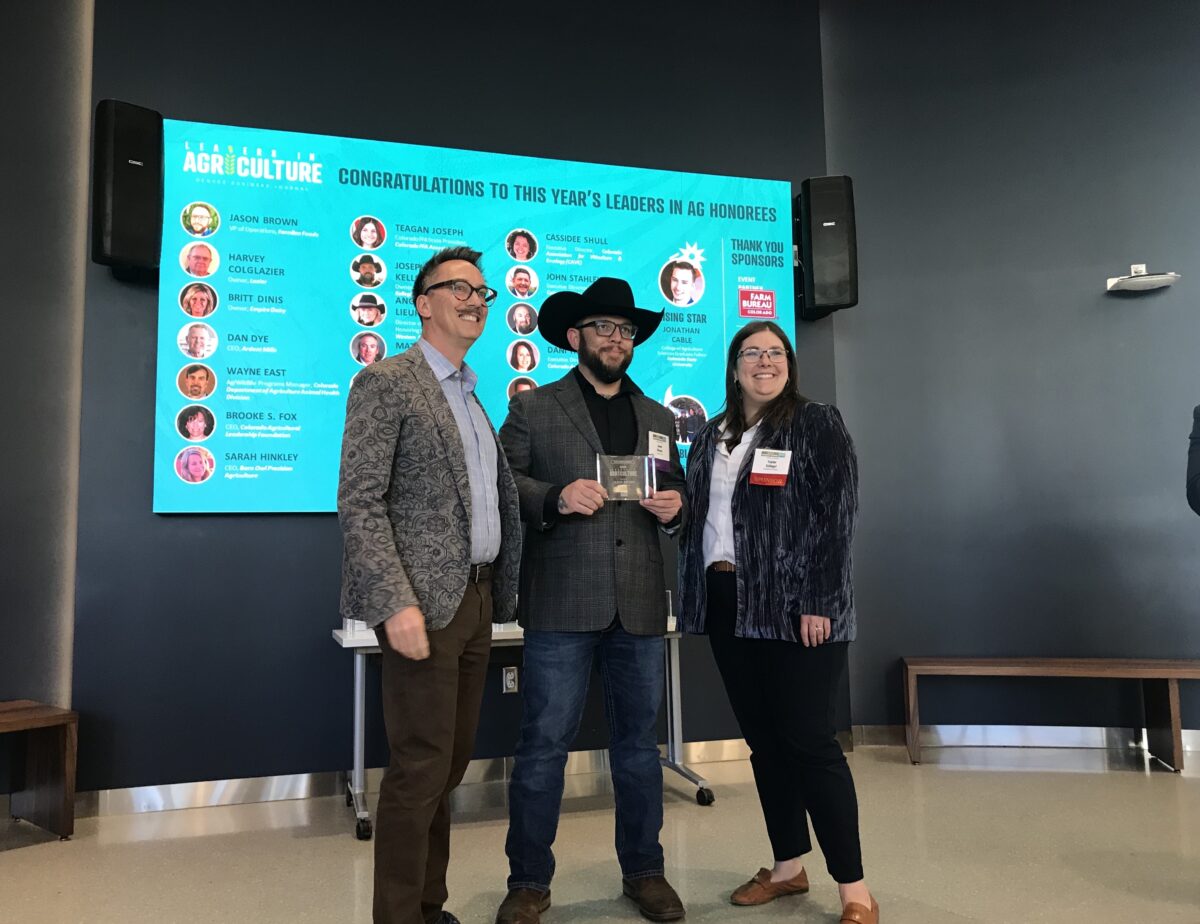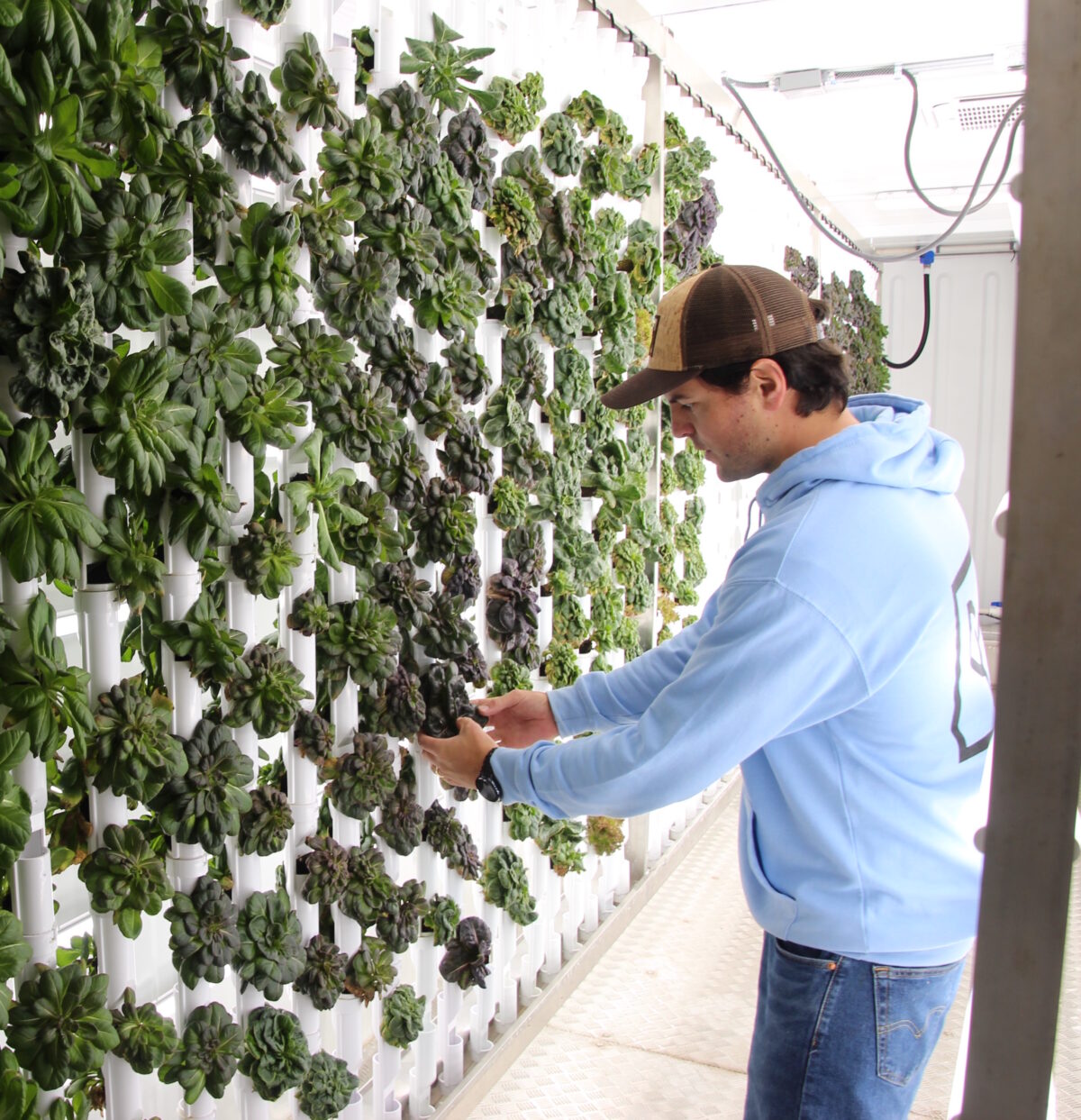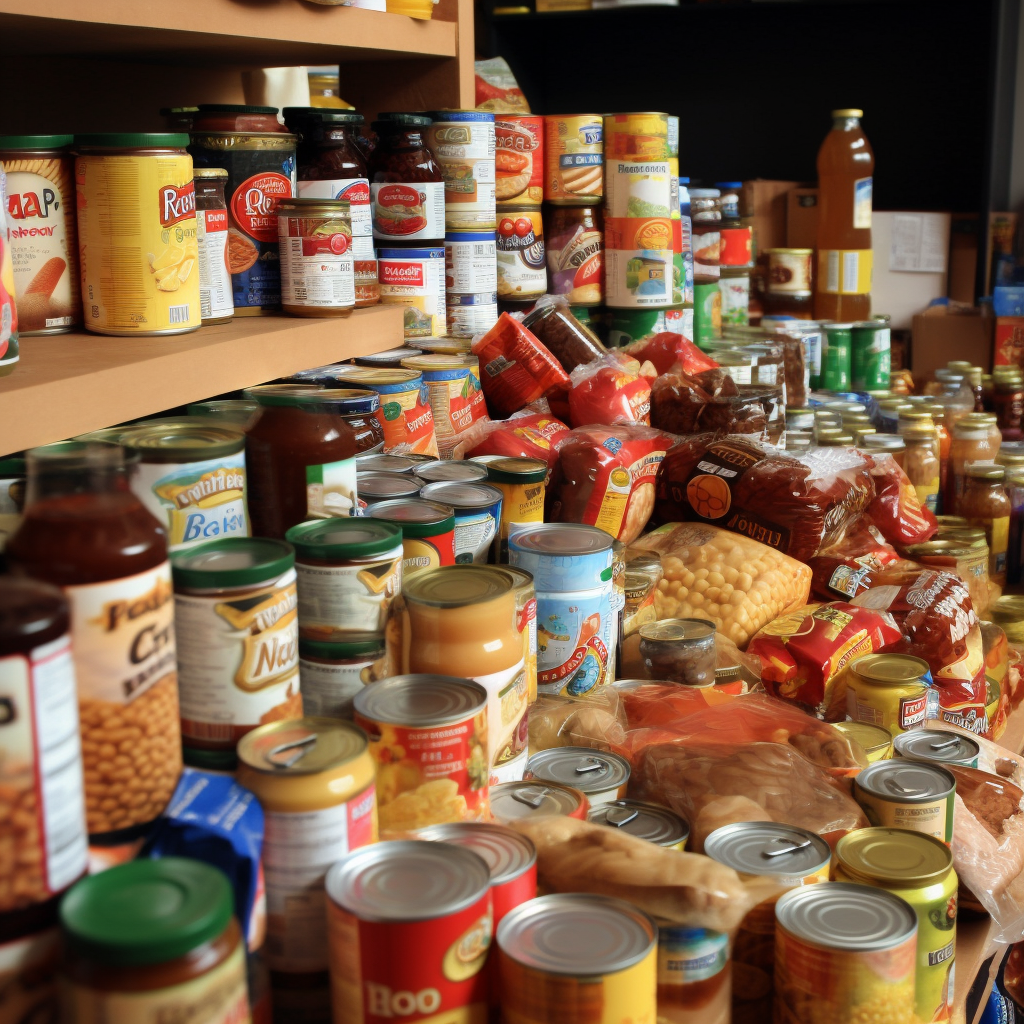The word ‘farm’ usually evokes certain images. You might visualize vast open fields stretching toward the horizon, dotted with rows of crops or grazing animals. A red barn with a pitched roof, a silo standing nearby, and perhaps a tractor parked beside a weathered fence. We’re trying to broaden the definition, and give people the ability to farm in places that historically have not been able to support agriculture for one reason or another. With continuing climate shifts and general uncertainty regarding our ability to properly feed a fast-growing global population, our ag technology can provide a lifeline by introducing sustainable, hyperlocal food production wherever it’s needed. Watch the video about small-scale farming being an option, even for those who have no experience in agriculture.
Category: In the Community
Food Security and Clean Energy Meet at UN Climate Week
FarmBox Foods LLC and New Alternative Green Energy, Inc. (New A.G.E.) announced the signing of a partnership that will provide food security to underserved communities and support initiatives related to clean energy and environmental stewardship.
FarmBox Foods is a Colorado-based manufacturer of tech-driven, controlled-climate farms housed in shipping containers, and New A.G.E. is a veteran-owned technology company with a portfolio of patented solutions aimed at improving global quality of life.
The containerized farms will be used to produce approximately 100 million servings of nutrient-dense food for people and animals over the duration of the partnership in 450 strategic locations throughout the world. Representatives from both FarmBox Foods and New A.G.E. are attending Climate Week NYC, the largest annual climate event of its kind, from Sept. 22-29, to discuss the companies’ missions and how they fit into larger sustainability goals.
FarmBox Foods brings its agricultural technology to food deserts throughout the world, empowering individual communities to grow their own nutritious food, eliminating supply chain issues and weather-related disruptions, and reducing emissions and other impacts associated with farming and food transport. FarmBox Foods will participate in extended collaborations with other sustainability-oriented companies in New A.G.E.’s portfolio.

“This is disruptive technology that has the ability to change the status quo for the better,” said Rusty Walker, CEO of FarmBox Foods. “We’re eager to work alongside New A.G.E. to collectively make a difference in the world.”
New A.G.E. is launching large-scale hydrogen infrastructure projects focused on making clean energy more accessible.
New A.G.E. leads the way in sustainable solutions with its diverse portfolio, encompassing
on-site hydrogen production, innovative fueling stations, advanced vehicle hydrolysis units to increase fuel efficiencies while reducing emissions, next generation solar technology integration, and water purification technologies. This comprehensive approach addresses environmental challenges across transportation, energy production, and agriculture, fostering a cleaner, greener, and more sustainable future.

“We are always working to change the way that things have always been done if there is a better way to do it”, said Michael C. Wilson, Jr., founder and Chairman of New Alternative Green Energy. “We are excited to work with FarmBox Foods to bring sustainable agriculture and energy together to work towards our mission, the Restoration of Creation, and to change the world.”
New A.G.E. also plans to create farm-to-table communities, also called agrihoods, in record numbers as part of broader economic development initiatives. The mixed-use villages offer residential living with a farm-to-table focus for families seeking a lifestyle centered around simplicity and sustainability.
About New A.G.E
New A.G.E. is a veteran-owned, mission-driven technology company with a portfolio of patented solutions aimed at improving global quality of life. The company’s core focus is on developing clean energy infrastructure, specifically that which makes hydrogen power more accessible, and to reduce the overall environmental impact of the existing infrastructure through its use of Vehicle Hydrolysis Units.
About FarmBox Foods
FarmBox Foods is a Colorado-based manufacturer of controlled-climate container farms that provide communities with the ability to sustainably grow healthy food year-round, anywhere in the world. The privately funded company brings food security and decentralized food production to areas in need through agricultural technology in the form of a Vertical Hydroponic Farm (VHF), Gourmet Mushroom Farm (GMF) and Hydroponic Fodder Farm (HFF). The high-yield, low-carbon-footprint container farms offer an alternative to traditional outdoor agriculture, which is subject to disruption from inclement weather, drought, conflict and more. The cutting-edge farm designs promote easy operation and maintenance while reducing the risk of food-borne illnesses.
FarmBox Foods, CORE Electric Unveil Tree Seedlings for Reforestation
On July 17, CORE Electric Cooperative (CORE) and FarmBox Foods, a Colorado-based manufacturer of controlled-climate farms, unveiled the first tree seedlings for a first-of-its-kind program focused on reforestation of wildfire-affected areas of the Front Range.
CORE’s Vertical Hydroponic Farm is housed inside an upcycled, insulated shipping container that FarmBox is using for research and development, with the goal of replanting blue spruces and ponderosa pines, both native species in Colorado, in places impacted by wildfires within CORE’s service area. 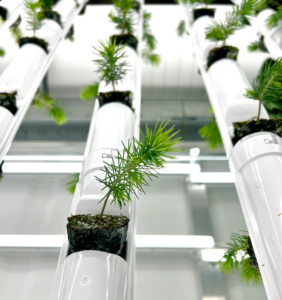
Guided tours of the box and interviews were provided by subject matter experts. CORE and FarmBox Foods’ executive teams also attended, as did research advisers from CSU-Spur and members of the media from 9News and The Denver Channel/KMGH.
“CORE’s partnership with FarmBox has given us an innovative way to support Colorado’s natural resources and continue our dedication to environmental stewardship,” said Pam Feuerstein, CORE’s Interim CEO.
FarmBox Foods began successfully growing tree seedlings and saplings in the controlled-climate container farm in 2021, but the Vertical Hydroponic Farm purchased by CORE is the first to be solely dedicated to tree propagation. FarmBox Foods operates the indoor tree farm at its home base in Sedalia and is conducting research on drought resistance, nutrient dosing, lighting and other growing parameters.
“We couldn’t have asked for a better partner to launch a ground-breaking program like this,” said Rusty Walker, CEO of FarmBox Foods. “CORE is pioneering something that could have a tremendous impact beyond just Colorado, and we have the technology and the team to make it happen.”
The Factors Behind the Surge in Urban Farming
Urban farming has surged in popularity in recent years due to a combination of factors. Concerns about food security and sustainability have prompted individuals and communities to seek alternative methods of food production. With urban populations growing rapidly and traditional agricultural land decreasing, urban farming offers a solution by utilizing underutilized spaces within cities for cultivation. This localized approach reduces the carbon footprint associated with transporting food over long distances and helps mitigate the environmental impact of conventional agriculture.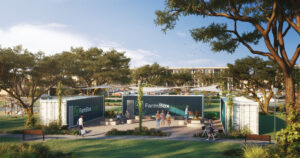
The desire for fresh, organic produce has driven the popularity of urban farming. Consumers are increasingly aware of the health and environmental benefits of consuming locally grown, pesticide-free fruits and vegetables. Urban farms can cater to this demand by providing a diverse range of crops year-round, often through methods such as hydroponics, aquaponics, and vertical farming. These innovative techniques maximize space and resource efficiency, allowing urban farmers to produce high-quality produce even in densely populated areas.
Urban farming also fosters community engagement and social cohesion. Many urban farms operate as community gardens or cooperative ventures, bringing people together to learn about agriculture, share resources and connect with nature. These spaces often serve as hubs for education, recreation and cultural exchange, enriching the social fabric of neighborhoods and promoting a sense of belonging. Additionally, initiatives such as rooftop gardens and guerrilla gardening reclaim vacant lots and neglected spaces (see Detroit as a prime example), revitalizing urban landscapes and transforming them into vibrant green spaces that benefit both residents and the environment. And container farms can be placed wherever there’s available space, including parking lots.
Economic factors contribute to the popularity of urban farming, too. For individuals and communities facing economic challenges, urban farming can provide supplementary income through the sale of surplus produce or value-added products like jams and preserves. Moreover, urban agriculture creates job opportunities in areas such as farming, food processing and distribution, contributing to local economic development and resilience.
As urban farming continues to evolve and expand, its multifaceted benefits are likely to further fuel its popularity as a sustainable and socially impactful practice in cities around the world.
Jason Brown Named Colorado Leader in Ag
We’re incredibly proud to announce that Jason Brown, our VP of Operations, is one of 22 people in the entire state of Colorado to be named as a Leader in Agriculture by the Denver Business Journal. Jason was employee No. 1 at FarmBox and he designed and built our very first container farm from scratch. 
A general contractor by trade, Jason has dived into his leadership role and oversees the deployment of all of our farms, among many other responsibilities. We’re fortunate to have a hardworking, forward-thinking person like Jason on our team, and we appreciate all that he’s contributed to our company and the world.
Jason was honored alongside the other 21 recipients during a ceremony on March 28, 2024, at the CSU Spur Hydro Building.
What ‘Supporting Local Farms’ Really Means
We often hear the phrase “Support your local farmers.” But what does that really mean?
Well, it contributes to the economic vitality of local communities in a major way. When consumers choose locally produced goods, they help sustain crucial local farming operations, preserving agricultural land and maintaining rural (and urban) livelihoods. In turn, this fosters a stronger economy by generating employment opportunities and encouraging entrepreneurship within the community. 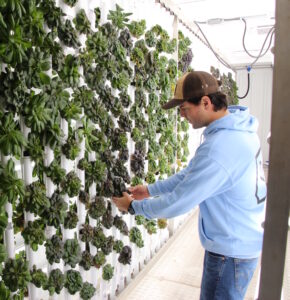
Supporting local farms also promotes environmental sustainability. Locally sourced produce often requires less transportation, reducing the carbon footprint associated with long-distance shipping. This can lead to lower greenhouse gas emissions, contributing to a more eco-friendly and sustainable food system. Many local farms prioritize sustainable farming practices, promoting biodiversity and soil health, too. These elements of the operations can’t be overstated.
Buying from local farms often means fresher and more flavorful products as well. Locally grown produce is typically harvested at peak ripeness, offering consumers higher nutritional value and better taste. This connection to fresh, seasonal ingredients can also foster a greater appreciation for the diversity of crops and promote a healthier diet, while ensuring that people have a longer period of time to eat the food before it goes to waste.
Supporting local farms plays a role in maintaining food security. By diversifying the sources of food production and distribution, local communities become less vulnerable to disruptions in global supply chains, like what we saw during the COVID-19 pandemic. This localized approach helps build resilience against external factors that could impact food availability and affordability.
In a social context, backing local farms fosters a sense of community. Farmers markets and direct-to-consumer sales allow for direct interactions between producers and consumers, creating a stronger bond and understanding of where food comes from. This connection promotes a shared commitment to sustaining local agriculture and can strengthen community ties.
In short, supporting local farms goes beyond the act of buying food; it’s a holistic investment in the economic, environmental and social well-being of communities. Choosing locally sourced products empowers local farmers, promotes sustainability, enhances the quality of food and contributes to the resilience and cohesion of communities. What more can you ask for?
How to Meet Food Demand for a Growing Global Population
Meeting global food needs in the coming years is going to require some ingenuity, marrying a combination of strategic changes and innovations across various aspects of the food system.
As you might have guessed, sustainable agriculture practices are at the forefront of what FarmBox Foods is doing as a company to help move that needle. It’s part of the company’s mission to promote and adopt sustainable farming practices, such as hyperlocal growing, conservation agriculture, and concepts that help minimize environmental impact and enhance long-term soil fertility. FarmBox is well aware that it’s not the entire solution, but we endeavor to play our part to the extent possible.
There are several things happening outside of our purview that we wholly support, among them: embracing precision agriculture technologies including sensors, drones and data analytics. But where we’re strongest is: optimizing resource use, improving crop yields, diversifying available foods, reducing food waste, and lowering the carbon footprint associated with agriculture.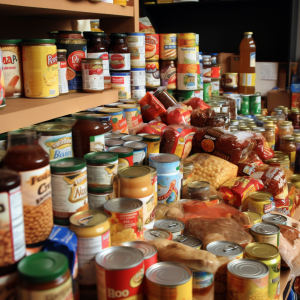
Perhaps the company’s strongest contribution is in helping to shore up the protein needs of communities in need. Conditions are such that raising livestock has become a gamble in some areas of the world, particularly where drought plays a large role. So what can be done? Large-scale mushroom farming in a container is filling those nourishment gaps.
Much work is being done to invest in crucial research and development of climate-resilient crop varieties that can withstand extreme weather conditions, helping ensure stable yields in the face of climate change.
Many nations are also implementing efficient water management practices, including drip irrigation and rainwater harvesting, to conserve water resources and address water scarcity challenges.
Developing and implementing strategies to reduce food loss and waste at every stage of the food supply chain, from production and storage to distribution and consumption, is also a key area of interest for FarmBox Foods, given that our model is meant to empower individual communities with the ability to grow their own food.
Governments worldwide are fostering international collaboration and partnerships to share knowledge, technologies, and resources to address global food challenges collectively. They’re implementing policies that promote sustainable agriculture, support research and innovation, and incentivize environmentally friendly practices. Likewise, more private sector entities are increasing education and awareness regarding sustainable and healthy food choices and promoting consumer understanding of the impact of their dietary habits on both personal health and the environment.
According to the U.N.’s Food and Agriculture Organization, we will need to produce 60 percent more food to feed a world population of roughly 9.3 billion by 2050. It’s an ambitious goal with staggering consequences if we get it wrong. Addressing global food needs requires a holistic, integrated and coordinated approach that considers social, economic and environmental factors. Sustainable and resilient food systems will play a crucial role in ensuring food security for our growing global population. Now is the time for each individual and company to calculate where and how they can contribute.
Why Localized Food Production Matters
Local food production, or “localized agriculture,” offers a range of benefits that can have positive impacts on individuals, communities, and the environment. 
Freshness and Flavor Matter!
When food is grown nearby, like in a shipping container farm, it can be harvested at its peak ripeness and delivered to consumers more quickly, which results in fresher and more flavorful produce compared to items that have traveled long distances.
Nutritional Value
Fresher produce typically retains more of its nutritional value because it spends less time in transit and storage.
Reduced Food Miles
Growing food locally reduces the distance it needs to travel from farm to plate. This reduces the carbon footprint associated with transportation, helping to mitigate climate change.
Support for the Local Economy
Local agriculture supports local farmers, creating jobs and contributing to the economic vitality of the community. It keeps money circulating within the local economy, which can have a multiplier effect.
Community Engagement
Growing food near the consumer often fosters a sense of community. Customers can connect with the farmers who grow their food, fostering relationships and trust.
Food Security
Hyperlocal food systems can enhance food security by reducing reliance on distant sources of food. In times of disruption, such as natural disasters or supply chain issues, local food production can ensure a more stable food supply.
Preservation of Open Space
Supporting local agriculture can help protect open spaces and agricultural lands from development, preserving the rural character of communities.
Customization and Diversity
Local farmers may be more responsive to consumer preferences, allowing for a greater variety of crops and specialty products. This can lead to a diverse and unique food offering, in addition to food that’s culturally relevant to the community as a whole.
Reduced Food Waste
Because local food doesn’t have to travel long distances, it is less likely to spoil in transit. This can help reduce food waste, which is a significant issue in many parts of the world. Around one-third of food grown in the U.S. goes to waste.
Cultural and Culinary Connections
Local food systems often celebrate regional culinary traditions and cultural diversity. Consumers can enjoy foods that are unique to their area and learn about local food traditions.
Seasonal Eating
Eating locally encourages seasonal eating, as consumers rely on what is currently in season in their region, which promotes a healthier and more diverse diet.
Health Benefits
Fresher produce can be more nutritious and may encourage people to consume more fruits and vegetables, leading to improved health outcomes.
Transparency and Accountability
With shorter supply chains, it’s often easier for consumers to trace the origin of their food and ensure it meets certain quality and safety standards.
While there are numerous benefits to growing food close to the consumer, it’s important to recognize that not all types of food can be grown locally in all regions due to climate and other factors. Therefore, a balanced approach that combines local production with responsible global sourcing may be necessary to meet all food needs sustainably. We will always need traditional farming to grow staple crops like corn and wheat!
Reflecting on an Uplifting Fundraiser for an AgTech Program
The smiles said it all.
We don’t often have the opportunity to see people working in our farms or enjoying fresh produce grown in a FarmBox. But that changed with our sponsorship of “Dancing with the Pueblo Starz” on July 15. 
The event included active participation by individuals with intellectual and developmental disabilities who work in the farm that was refurbished by FarmBox Foods and purchased by the nonprofit, Pueblo Diversified Industries. The Vertical Hydroponic Farm is used as the centerpiece of its Fresh Greens Colorado business, which doubles as a workforce development center for this underserved population.
The night was nothing short of magical. PDI and the seven couples who performed the featured dance routines raised $75,000, which will go toward supporting their agtech program. Eric Gostenik (Director of National Sales at FarmBox) had the opportunity to dine with one of the developmentally disabled farmers and witness his reaction when he saw a video of himself talking about working in the farm. The farmers also participated in their own rehearsed dance routines.
Seeing this community rally around their own and around a program with infinite potential to transform lives was an opportunity of a lifetime. It brought the reasons why we do what we do to the forefront. We had the chance to meet city and county leaders, and I got to share a little bit about our company and our mission to the 600+ attendees.
To me, this is only the beginning of our work in Pueblo. There’s a significant need for food access, and when you can include a subset of people who find purpose and joy in helping others, it benefits everyone. We get to tell these stories and, ideally, show people outside of the company just who we are and what we believe.
This partnership was wholy a team effort. Eric shepherded PDI through the sales process, Jason Brown (VP of Deployment) and Jesse Gantzler (Quality Control Manager) put in a lot of work moving and refurbishing the VHF to be in ready condition, and they along with farm trainers Nick Brooks and Mollie Sullivan have provided support during operational challenges. Joseph Cammack (Executive VP) and Eric attended the Saturday night event in Pueblo and represented the company well while thinking about future partnerships with those sitting at our tables. I (Chris Michlewicz, VP of Communications) nervously gave a speech about who and what FarmBox, why we sponsored the event, and I even managed not to tear up when talking about the uplifting videos of those who work in the farms.
This is the ideal customer. They want to do good in the world, they know the impact of our container farms, and they’re serving as our ambassadors in Pueblo. This is what it’s all about.
FarmBox Foods Proud Sponsor of Dancing with the Pueblo Starz
FarmBox Foods was the proud “executive producer” of Dancing with the Pueblo Starz, which raised more than $75,000 for agtech programming.
The fundraising event at the Pueblo Convention Center benefitted Pueblo Diversified industries and Fresh Greens Colorado, an indoor farming operation in Pueblo that provides job opportunities for individuals with intellectual and developmental disabilities.
PDI and Fresh Greens Colorado are dedicated to supporting and empowering the community while becoming a catalyst for change. The donated funds will help transform the lives of these extraordinary individuals by enhancing their independence through vocational training and life skills development in a Vertical Hydroponic Farm built by FarmBox Foods. From job training to job placements, the money raised will support this hub where the whole community can connect, share experiences, and find a sense of belonging.
About PDI
Those with severe diverse abilities may need an additional hand-up in reaching their goals. PDI has a team that nurtures, supports, and guides the process, all driven by the individual. This team assists them in moving forward in life to their place of greatest comfort in work, home and recreation. We help our people leave limitations at the door through life-enhancing opportunities both in-house and within the community.
At PDI, our programs are specifically designed to provide a wide variety of choices and options, to engage both the body and mind. Because we are person-centered, we create the space for choice, ranging to serve younger individuals to those with more life experience; those who are independent to those who require more personalized care.
Each individual can choose from a wide array of activities and programming, include games and community outings, classes ranging from Spanish to cooking to computers, social skills activities, music and dancing lessons.



